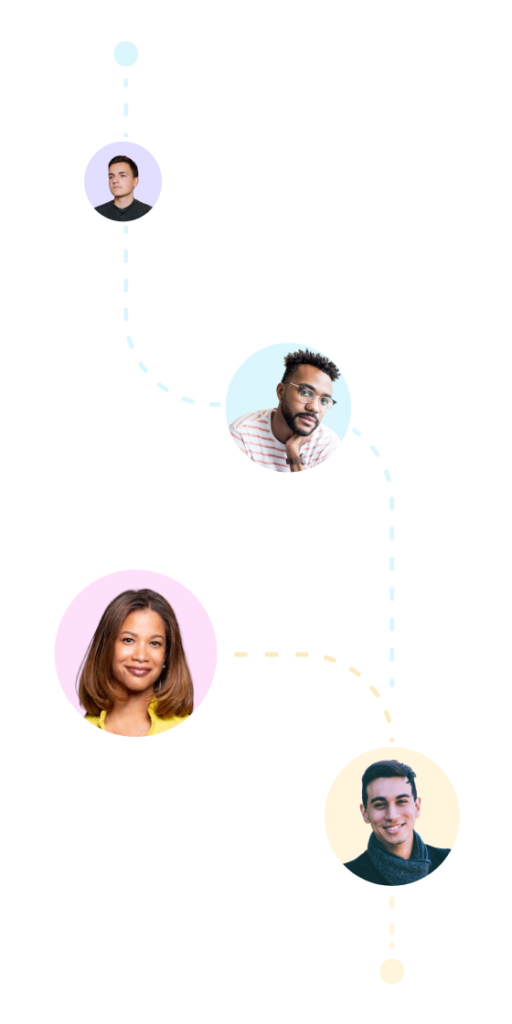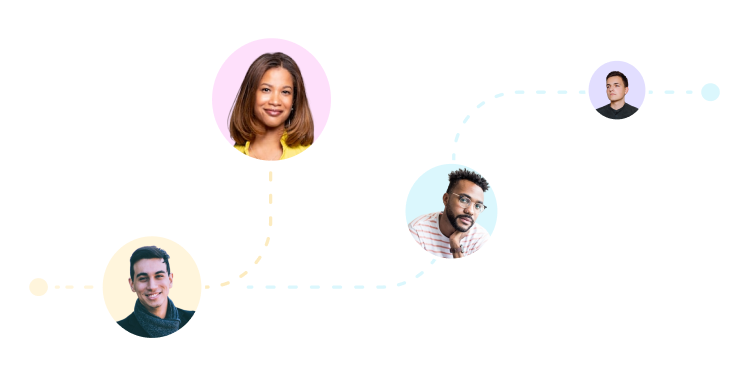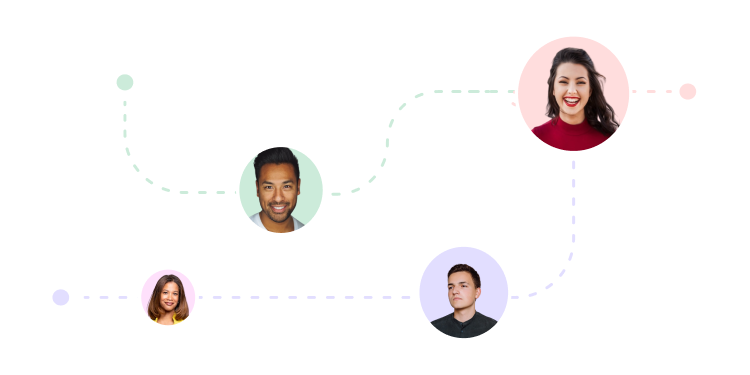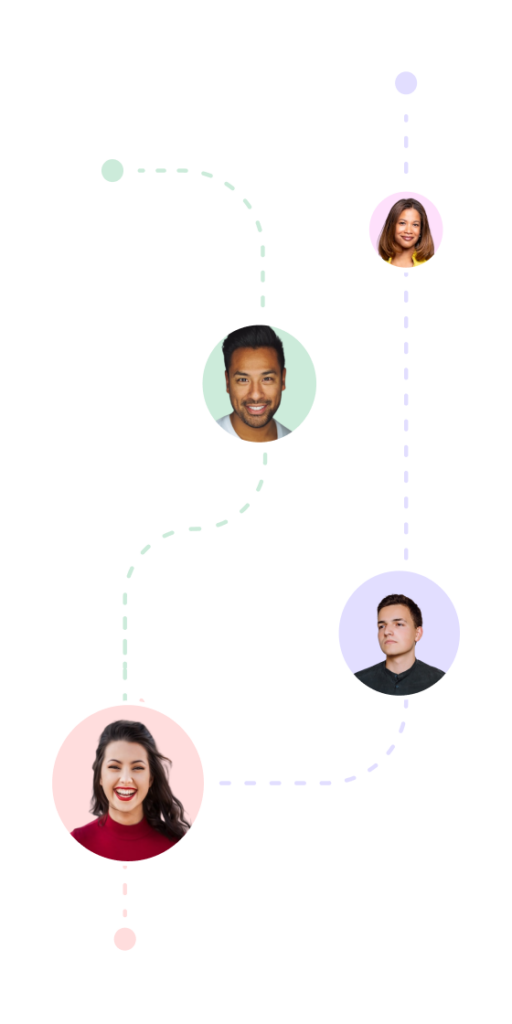Are you a creator, a small business owner, or a business owner with a niche specialty? A social network of like-minded peers can help you grow in the right direction.
The post Why an Online Entrepreneur Community Is Your Next Best Move appeared first on Smart Passive Income.
]]>Building an online business or establishing an online presence for your business can be a lonely road. There are countless unknowns, and each journey is entirely unique, leading to frequent confusion.
Don't do this alone. By joining an online community centered around a shared purpose, you gain support, guidance, and feedback. It can help you improve your skills, fill in knowledge gaps, stay accountable, and effectively work towards your goals.
We at SPI Media know a thing or two about virtual business communities — we're the founders of two of them! Through the experience of hundreds of members and the incredible success stories we've heard (like this one), we've discovered how to build healthy communities that contribute to real, meaningful results for our members.
Pat Flynn (our founder) shared his experience and the social-driven reasons for joining an online business community in this article. Below, we’ll share why joining an entrepreneur community is the best move for your journey, plus the unique ways our communities are designed to help you on your way.
Support for Every Part of Your Business Journey
A creator community isn't just for YouTubers with billions of views, and an entrepreneur community isn't just for folks with an idea scratched on the back of a napkin. Regardless of your stage of business growth, there's a business community out there for you.
Many communities cater to new entrepreneurs — groups of people with great ideas who want to achieve structural progress like building a website or starting a podcast.
Others are designed for people who have an established presence, with a certain amount of recurring revenue or a volume of monthly customers.
Still, others are designed intentionally around a common interest in a niche — folks with brick-and-mortar stores or fitness coaches who primarily teach via the Internet.
Regardless of where you are in your journey, an online entrepreneurial community offers incomparable opportunities for support. Questions can be posted and responded to by people worldwide, and because that post is visible to all, everyone learns from the answers. Or, questions can be explored in real-time during community events via video conferencing.

Virtual Communities Combat Loneliness
New online communities — business-related or otherwise — are springing up constantly. The popularity of online communities as a response to the loneliness epidemic has never been as prevalent or critical as it is now. A 2023 report from the U.S. Surgeon General found that loneliness affected half of adults before the pandemic, linking loneliness with risks like heart disease, stroke, and dementia.
Combine those risks with the inherent solitude of entrepreneurship, and it's clear that online creators and business owners are particularly affected by this.
An online entrepreneur community offers an antidote to this: peer connection, giving and receiving feedback in mastermind groups, and real-time events for networking.
Ready to find join your people and level up?
Like you, we're online entrepreneurs who crave connection, direction, and support from people like us.
Learning Entrepreneurship: Together
When entrepreneurs come together in a virtual community environment, there are lessons everywhere. These lessons happen organically simply because of the nature of being in an environment of peers. The opportunity to share findings, experiences, successes, and failures is unparalleled.
But some communities go a step further, like our own All-Access Pass community. We built this particular community with early-stage entrepreneurs in mind and designed it as a community-based learning experience for our members.
Through the All-Access Pass, members get access to our entire course library, covering everything from YouTube mastery to launching a podcast, building a community, affiliate marketing, and more.
But rather than just offering courses as a perk, the community is designed to facilitate cohort-based learning. One of the ways we do this is through accelerators, allowing students to go through a course as a “class” alongside support and guidance from our team. We also created pathways, which act as suggested navigational tracts through multiple courses, built around a specific aim — such as creating, growing, and profiting from a podcast.
These features, as well as community programming like fireside chats, ask-me-anything (AMA) sessions with Pat Flynn (our founder), networking events, and live teaching opportunities, create a community experience where learning is at the forefront. This robust and active community component supports and enhances growth and progress.
Expert Advice at Your Fingertips
Online business communities are most often built by people with a stake in the game, and it follows that many of these communities — if reputable and built by the right people — attract experts in their fields as members. Often, these communities offer opportunities to network and have questions answered by experts as a perk of membership, enhancing the experience for members.
Our SPI Pro community — designed for established entrepreneurs looking to scale their business to new levels of success — is full of professionals, many of whom are experts in their niche or business.
We also boast a robust Experts in Residence Program that takes expert access a step further. This program consists of a network of renowned professionals who interact directly with our community members, offering opportunities for deep learning and next-level business advice. Much of our community programming is built with the help of these experts, including workshops, roundtable discussions, and more.

Connection and Networking
Our community members have started podcasts together, collaborated deeply on marketing plans and cross-promotional efforts, formed lifelong friendships, and helped each other achieve new heights of success in their businesses. We wouldn't dream of taking the credit, but the ability to provide a vibrant space for connecting people and facilitating learning opportunities is the very reason we exist.
Another huge benefit to online business communities like ours is the opportunity to form masterminds. These are groups that meet regularly to provide feedback, hold each other accountable, and align on next steps — all while working independently on their own businesses. The structure of masterminds can vary considerably — some take turns putting each other in the weekly “hot seat” for example — but they all have supportive growth at their core. As a perk of an SPI Pro membership, we offer to match members with existing mastermind groups, but we also love seeing folks forming new ones on the fly.
What All Communities Have in Common
The right people, of course!
The best online entrepreneurship communities aren't free-for-alls. Adding new members is kind of like fiddling with the ingredients of a complicated recipe — it can't be done ad hoc.
That's why we built an application process into our communities. For our SPI Pro community in particular, its important that we bring entrepreneurs together at the appropriate stage of their business's growth. Including an application stage also helps us ensure that the folks coming in are serious about growing together and are aware of the community guidelines.
Many business communities exist. But with our combination of community-centered learning, access to experts, and robust events, we believe ours is the best one out there. Visit our Community page to learn more.
No matter which community you end up joining, get connected! Learning entrepreneurship is one of the most challenging things you can do in life, and also the most rewarding. Don't make it harder than it has to be — find your people!
Ready to find join your people and level up?
Like you, we're online entrepreneurs who crave connection, direction, and support from people like us.
The post Why an Online Entrepreneur Community Is Your Next Best Move appeared first on Smart Passive Income.
]]>I select a specific word or phrase each new year that I carry with me throughout the year for inspiration – I recommend you try it!
The post A New Year Tradition appeared first on Smart Passive Income.
]]>Every year around this time, I come up with a word or a phrase to inspire my new year, one that I’ll keep with me as a reminder as the year passes on.
This isn’t anything novel. I first heard about this from a friend who I reconnected with after college. He told me he actually tattooed the new word every year on himself, to which my response was:
“Is the word of the year this year, CRAZY?”
I wouldn’t take it that far (plus, wouldn’t he eventually run out of room?) but the idea of a word of the year has been with me for five years since, and it’s a neat little mechanism for keeping myself in check.
My word last year was “celebrate” because my toxic trait is to accomplish something and then immediately start the next thing before I even have a chance to enjoy the moment.
Having the word written in my mind (and tattooed on a Post-it Note by my desk) became a gentle reminder to help me slow down and become more grateful for the things that happened this year.
I’ll share my 2023 word with a story. Perhaps this will inspire you to select a word to help you get unstuck next year.
One of the hardest challenges…
I ever had to overcome as an entrepreneur was writing my book, Will It Fly? Although it was self-published, which meant I could move it much faster than traditional publishing methods, the book still took me over 2 years to complete.
Why did it take so long?
Because I wasn’t being me.
You see, right before starting to write this book in 2013, I read a ton of books from one of my favorite authors, Malcolm Gladwell. As I was absorbing his books, I was also absorbing his writing style.
His books are so well-written, I thought that in order for my book to be just as good, I had to write just like him.
From fascinating scientific studies to the informative connections he creates between them, I set out to do just the same, and unfortunately, it stopped me in my tracks.
After 3 months of absolute frustration, I quit writing.
“I guess I just wasn’t meant to write this book,” I told myself.
Fast forward to 6 months later. A friend asked me how my book was coming along, and I told him the story. Then he said the following:
“You’re not Malcolm Gladwell. You’re you. Why are you trying to write like him? Write like you.”
Gamechanger.
It seems so obvious years later, but as you know, it’s easy to fall into these traps.
Soon after that discussion, and also with the help of a writing coach I hired, Azul Terronez, I was writing like me, and the words started to flow.
This coming year, 2023, I’m writing a new book. This time, it’s with a traditional publisher, and instead of putting the “it must be like all the other great traditionally published books out there” spin on it, I NEED to continue to be my authentic self across all of my work, especially here with this new book.
I’ll share more about the book later. For now, this is my word of the year to guide me throughout 2023:
Authentic.
Your Call to Action
Now your turn. What’s a word to gently nudge you throughout next year, to keep you on track and remind you about where you’re going?
Write it down and place it somewhere you know you’ll see it. Here’s to you and an amazing 2023!
The post A New Year Tradition appeared first on Smart Passive Income.
]]>The future of community and online education is now.
The post We’re Reinventing Online Education for Entrepreneurs (Because It Needs It) appeared first on Smart Passive Income.
]]>The digital world moves pretty fast, but the way experts and leaders are teaching new entrepreneurs hasn’t really changed much over the years.
And in the digital world, “years” means a very long time.
I took my first online course in 2008. Today, they don’t look much different: a video-centric, do-it-yourself solo adventure.
- Watch a video lesson.
- Do the video lesson thing.
- Hope for the best.
- Have no one else to really talk to about it.
No wonder the average completion rate for an online course is 15%!
Although our average completion rate at SPI is above that number, we still knew that we could do better. In testing various approaches to SPI’s courses, a study by The American Society of Training and Development supported our theory on the importance of accountability in completing online courses. This study found that people are 65 percent more likely to meet a goal after committing to another person; their chance of success increases to 95 percent with ongoing meetings with their accountability partners. This study, coupled with completion rates from thousands of SPI courses taken, shed much-needed light on what has been missing within online courses—the connection and accountability that comes with community.
With that, we’re thrilled to introduce you to community-powered courses.
Although we didn’t come up with the term itself, it’s exactly what we’ve created here at SPI.
SPI’s community-powered courses combine the connection and accountability of a professional community with innovative course curricula and custom-built educational pathways. It’s the community that will help propel success with these courses, much like how we all know it’s easier to go to the gym and get better results when you’re doing it alongside others who share a common goal.
There’s an energy there, but there’s also real support and accountability, too.
SPI’S All-Access Pass
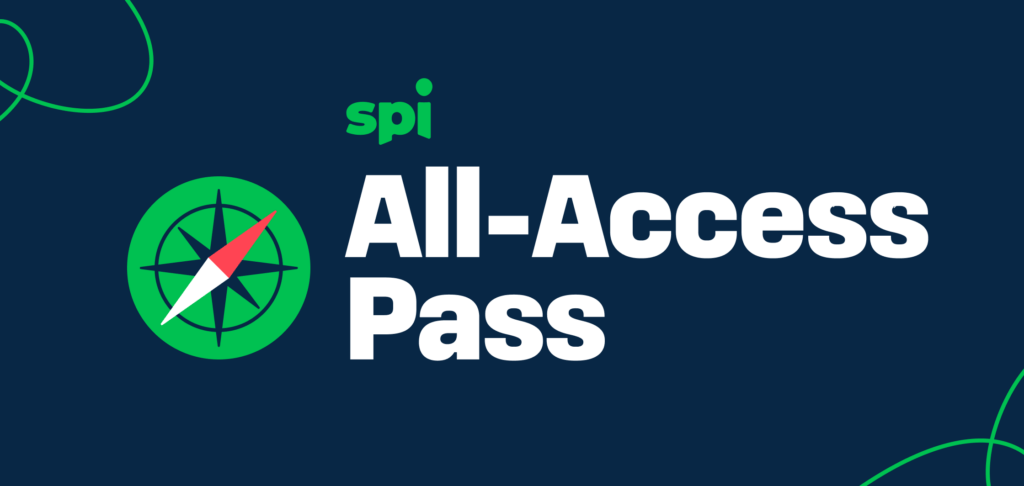
We’ve sold traditional online courses since 2017, but starting in December 2022, we’re changing it up and launching our version of community-powered courses.
With our experience running communities at SPI and micro-testing this kind of curriculum within a community, this is the natural next step for us, and we want to lead the charge for others too.
SPI’s All-Access Pass gives you access to SPI’s trailblazing course catalog with new curriculum and workshops built by experts. (Hence, all-access.)
But gaining entry to our courses alone isn’t the point—that would actually be counter to the goals of what we’re trying to achieve. What you don’t need is more information, it’s the right information at the right time, with the right support system alongside it.
Pathways
In addition to our course library and workshops (with new workshops added monthly), you’ll also have access to custom pathways that act like a roadmap to help you reach your business goals faster.
For example, if you’re just starting out in online business and have yet to even pick your niche, you’d go through our Starter Pathway, which works like this:
- Start by going through our course Smart from Scratch, to nail your niche and define your target audience.
- Next, build your website and claim your brand online with our course, Build Your Own Brand.
- From there, you’re going to want to get into our Traffic Booster Workshop to focus on a couple of ways to begin to drive traffic to your new brand.
- And finally, you’ll head into Email Marketing Magic to start building up your email list and a database of potential customers
Or, perhaps you want to start (or have already started) a podcast. You’d be perfect for the Podcasting Pathway:
- Work your way through Power-Up Podcasting to get your quality show up and running as soon as possible.
- After that, make your way through our Podcast Advertising Workshop to begin generating revenue from ads and sponsorships relevant to your brand.
- Then, Amp’d Up Podcasting will take your podcast from beginner to advanced by automating most of the workload and building a business strategy using your show.
- From there, you’re ready to take on the Video Podcasting Playbook Workshop so you can begin to repurpose your content and add it to video platforms for even more reach and findability.
We also have an Income Booster pathway, and more will be added over time.
Learn more here. If you’re interested….
The Future of Community Is Now
The clincher is that with All-Access Pass, you have SPI’s team of experts to support you, as well as opportunities to connect with other entrepreneurs in the community.
In addition, we’ll be leading cohorts of students through the various pathways and individual courses. With this, you’ll still have the crucial accountability that comes with a cohort-type setup, without hours of set meeting times.
This is the best of what we have to offer, put into a package that will best support entrepreneurs as they launch and grow their businesses.
Oh, and the best part—the price of access is significantly cheaper than buying an individual course, which doesn’t include community, custom programming, or the pathways as a part of the package.
This allows us to support more entrepreneurs, and hold them accountable to achieve their goals with our proven educational materials and the irreplaceable support of our community.
All future courses and workshops will be included in All-Access, and we will be releasing a new workshop about Goal Setting for 2023, led by yours truly, very soon!
We really hope to set an example here in the industry. If you’re interested in learning about building an online business you can be proud of, give our All-Access Pass a try!
The post We’re Reinventing Online Education for Entrepreneurs (Because It Needs It) appeared first on Smart Passive Income.
]]>Don't let fear hold you back from taking risks and growing your business.
The post How to Face Your Fears and Become the Courageous Entrepreneur You Want To Be appeared first on Smart Passive Income.
]]>If you’re an entrepreneur, you’ve probably already taken a leap of faith to start a business, launch a podcast, or stand on a stage to give a keynote address. But fear of failure can often get in the way of our success. So how do you face your fears and find the courage to take the risks that will help you get to the next level of your business and success?
Let’s be honest. Fear is a part of being human, and some fear is even healthy. “Fear is our survival response,” says Northwestern Medicine Clinical Psychologist Zachary Sikora, PsyD, in this article. “Fear is a natural and biological condition that we all experience. It’s important that we experience fear because it keeps us safe.”
It’s also a BIG part of being an entrepreneur. As Pat says in this episode of Ask Pat: “Failure is a very necessary thing to go through as an entrepreneur. You have to go through failures. If you ask any successful entrepreneur out there if they've ever failed, they'll say, ‘Absolutely!' And the fact that it was actually required for them to get to where they're at now. That's how you know. And here's a quote that . . . has changed how I feel about fear and why it's important to think about it in this way, to embrace the fear like you said. And that is, ‘I would much rather live a life full of ‘oh wells' than a life full of ‘what if's.'”
While some fear is healthy and keeps us safe, when it’s out of control it can determine all of our choices in life, and the result will be a small, unfulfilling existence.
- Instead of taking that leap to start a business, a fearful person may cling to an unfulfilling 9-5 job just to have a sense of safety.
- Instead of writing a book they’ve always wanted to write, a fearful person will sit on the sidelines, and seethe with envy when a colleague writes a best-seller.
- Instead of pursuing speaking gigs, a fearful person will keep doing the same old things, clinging to comfort, while failing to share their expertise and gifts with the world.
The Many Faces of Fear
Fear comes in many different forms for an entrepreneur. These include:
- Fear of failure: For entrepreneurs, this fear is not unfounded. Studies from the the U.S. Bureau of Labor Statistics suggest that about 75 percent of ventures fail within ten years. So fear of failure is baked into the life of an entrepreneur, and many go through many different false starts before finding success.
- Fear of not being good enough: Many of us suffer from “imposter syndrome,” fearing that we don’t have what it really takes to be successful. We fear that at some point others will find out we’re not up to the task. This feeling manifests in many ways, including perfectionism, workaholism, self-sabotage, and underachievement.
- Fear of financial insecurity: This is a big fear that often keeps us tied to jobs we don’t like. The term “golden handcuffs” describes a scenario where someone stays in a secure, well-paying job for the convenience and comfort, rather than embarking on a journey toward a passion, like starting a business. The current pandemic and the economic instability caused by it have made this fear even worse. And lack of any safety net—like not having the privilege of generational wealth, for instance—can justify this fear of financial insecurity.
- Fear of disappointing family and friends: You might have people and employees counting on your income, which makes it even more difficult to take any risks. If you fail, it will affect more than just you. So fear keeps you paralyzed. Or, you may seek the approval of others, like parents or a spouse, which keeps you from taking any risks.
- Fear of the unknown: There are many things out of our control, like a pandemic, an economic downturn, or an illness. None of us knows what will happen in the future. What happens if you start a business, and then a pandemic happens? Or what happens if you get sick? This fear of the unknown can prevent us from making any moves that will lead to success and fulfillment.
What to Do When Fear Holds You Back
Use fear to motivate you
So what do you do if you realize you’re resisting taking that leap, taking a risk to start a business, write a book, hire a team, or move forward with that great idea you have for a new product?
In Stephen Pressfield’s book The War of Art he writes, “‘Are you paralyzed with fear? That’s a good sign. Fear is good. Like self-doubt, fear is an indicator. Fear tells us what we have to do. . . . The more scared we are of a work or calling, the more sure we can be that we have to do it.”
So instead of letting fear paralyze you, instead lean into it. Use it to inform you of what you need to do next.
Stare fear in the face
The great Eleanor Roosevelt once said, “You gain strength, courage and confidence by every experience in which you really stop to look fear in the face. You are able to say to yourself, ‘I have lived through this horror. I can take the next thing that comes along.' You must do the thing you think you cannot do.”
Some people have also attributed this dictum to Eleanor Roosevelt: “Do one thing that scares you every day.”
Learning to face your fears is like training for a marathon. You need to strengthen those muscles and discover that facing your fears will not destroy you. Instead, each time you face your fears you will feel stronger and more confident.
Shut down the voices in your head
In this AskPat episode, Pat talks about the voices in our head that say we’re not good enough, or that we shouldn’t do something. He says, “Those voices in your head, they can really get at you. Really what it's about is not learning how to get rid of them because they're always going to be there, but it's about learning what that voice means, and also how to control that voice, and how to sort of react from it.”
If you’re facing something you’re afraid of, Pat says, ask yourself, “‘What's the worst thing that can happen?’ When you really get realistic with that question, oftentimes the worst thing that can happen isn't so bad.”
You should also surround yourself with amazing, like-minded people, Pat says. “You are the sum of the five people you hang out with the most or you converse with the most. If they are all negative and unsupportive, you yourself will be negative and you will not support your own efforts. You will constantly have these negative thoughts and then not take any action or go back to where you're comfortable.”
Take action
W. Clement Stone, a businessman and philanthropist, said, “Thinking will not overcome fear, but action will.”
It’s so easy to get stuck in a fearful mindset. But just taking one small step toward facing your fear will help you get unstuck. This article talks about how just taking a step toward commitment will help you take action. “If you want to take action, which will eliminate fear, the only thing you need to do is make a commitment. Why? Commitment means an action is taking place and your brain is focusing on something else besides the fear.”
So the first step is committing to do something. Then write down all of the other action steps you need to take to do the things you’re afraid of. If you want to speak on stage but are terrified, you could start by doing research, or signing up for some public speaking classes, or talking to other people who are public speakers to get their advice. Take it one step at a time, but start taking those steps!
The post How to Face Your Fears and Become the Courageous Entrepreneur You Want To Be appeared first on Smart Passive Income.
]]>Entrepreneurs suffer from loneliness at alarming rates. It's time to start talking about it.
The post 5 Ways Entrepreneurs Can Conquer Loneliness and Feel More Connected appeared first on Smart Passive Income.
]]>Tony Hsieh, entrepreneur and founder of Zappos, seemingly had everything.
He was worth millions. He had a degree from Harvard, was surrounded by famous artists and entrepreneurs, and wrote a book, Delivering Happiness: A Path To Profits, Passion and Purpose.
So when news that Hsieh had died on November 27, 2020 from complications of smoke inhalation when a fire broke out in the home of a friend where he was staying, it came as a shock to many.
As news trickled out during the days following his death, it became apparent that he had been struggling with alcohol and drug addiction, depression, and loneliness for quite some time. Mentally, he was in a downward spiral, and the pandemic had exacerbated Hsieh’s isolation and loneliness. In a Forbes article about Hsieh, apparently his friends and family had tried to intervene, to no avail.
Although the fire is still under investigation, there’s some indication that his drug addiction and destructive behavior caused the fire or contributed to Hsieh’s inability to escape it.
Entrepreneurs Are a Lonely Bunch
Loneliness has become an epidemic in America. The global health service company Cigna recently released results from a national survey exploring the impact of loneliness in the United States and found that almost half of Americans report feeling lonely.
The problem of isolation is even worse for entrepreneurs. Starting and growing a business, it turns out, can be extremely lonely. A recent study found that entrepreneurs who experience occupational loneliness are more likely to burn out. Another study showed that half of CEOs report feelings of loneliness in their role.
“We’re told things like ‘fake it till you make it’ and ‘just keep pushing and you’ll get there,’” says Jay Clouse, an entrepreneur who recently became SPI’s Community Experience Director. “But it’s a really, really tough road. And we fear sharing the challenges because people will think if it’s not successful, then ‘I’m not going to pay attention to it or invest in it.’”
“We're afraid to let people into the reality of what's going on because we don't want to undermine our own efforts,” says Jay.
The need for connectedness is a basic ingredient for psychological growth and well-being. But there are many forces that contribute to entrepreneurial isolation, including:
Other People Don’t Understand Entrepreneurs
Entrepreneurs are unique human beings. It takes a certain kind of person to take risks and chart their own path, and they may be constantly having to deal with the “doubters” and hand-wringing family members. Not everyone understands or condones their decisions.
“Being an entrepreneur is not normal. It's not what most people do,” says entrepreneur Jeff Gargas, who is the Co-Founder and COO of Teach Better Team. “Because of that, most people don't understand what it is actually like running a business. Most people don't understand how your brain works. And when most people don't understand you, how you think, what you do, and how you feel, it's lonely.”
Entrepreneurs Have to Make the Final Decisions
For entrepreneur Heather Newton, founder of Protospiel Online, the thing that stirs up the strongest feelings of loneliness is “the pressure of being the one that makes the final decision for anything that needs to happen in my business. Although I can ask for input from my trusted circle of friends, I know that the decision is ultimately mine, and that can feel scary and lonely — especially when the decision is big and hairy.”
There’s added pressure when you know your decisions will affect your employees and family. There may be a lot of people depending on you to make the right decisions and succeed. When you have the sole responsibility of making decisions that will affect others’ lives and livelihood, there’s no one to turn to for support. It’s only you.
Entrepreneurs Typically Work Alone
“I used to travel alone as an equine photographer,” says Olie Moss, founder of Equine Photo School. “I would live alone far from friends and family. Life as a traveling entrepreneur is tough. I could at least call home and chat with my parents who are also entrepreneurs who understand the stress and struggle.”
The pandemic has made this issue much worse. Studies have found an “alarming” increase in loneliness since the arrival of COVID-19. More and more people are working from home—alone.
“I spend so much of my day(s) at my computer, working on project tasks, organization, etc.,” says Jeff Gargas. “Even with a team, most of my days are just me. I love when I have meetings, or someone interrupts my day because so often I have almost no contact.”
Entrepreneurs Face Long Hours and Hard Realities
It’s common knowledge that being an entrepreneur can mean long hours. Bringing your vision to life takes time and commitment. Studies have shown that twenty-five percent of founders work over sixty hours a week, which affects their physical and mental health.
And it goes without saying that working sixty hours a week leaves little time for relationships. Beyond long hours, the financial stress of starting a business, and waiting months or even years to become profitable, can take a toll on your partner and family, leaving you even more vulnerable to isolation and loneliness.
Entrepreneurs often have to face hard realities as well. “A lot of entrepreneurs have teams,” says Jay. “They're leaders of organizations and they often find that they have to shield some of the hard realities from their team in order to protect the team's psychological well-being. Also, your family probably doesn't have a lot of experience with it and doesn't understand. So who do you talk to?”
5 Ways to Fight Loneliness as an Entrepreneur
So what’s the solution? Here are a few tips that will help to keep you connected, happy, and healthy.
#1: Seek Out Connections
Finding people you can talk to, and developing true connections, is key, says Jay Clouse.
He actively seeks out people who “get it.” When he first started his business, he went to a bunch of local meetups in Columbus, where he lives, and built a local community.
“I just think it's really important to talk about it. And as hard as it is, you need to be able to confide in someone—it could be a partner, a friend, a business partner. You need to tell somebody if you're feeling this way or it's going to fester and get worse. And it seems to build up and get harder the more time that you let pass.”
During a particularly hard time in his entrepreneurial journey, Jay reached out to a friend, who was going through a similar situation, and the two met up for dinner once a week. “We didn't actually talk about our businesses that much. We just knew that we were both in it. There was something about that, that comradery and connection, knowing that this person gets it and that they're not asking how the business is going, because they know that I don't really want to talk about that because it is challenging.”
For Heather Newton, she finds that attending conventions and meetups with others in her industry is helpful. “When we’re not in a pandemic, I attend several local and out-of-state board game conventions and other meetups for entrepreneurs and various types of creatives. Whenever I start feeling lonely, it’s nice to have a date on the calendar that I can look forward to as a chance to be with like-minded people.”
But during the pandemic, Heather says, she participates in peer mastermind video calls, and keeps up with what her favorite communities are doing through online groups. “I try to be choosy and only put my time into online spaces with an encouraging, fun, and hopeful tone.”
#2: Create “Water-Cooler” Moments
Another way to create connections is by building in water-cooler moments throughout your day.
If you were a regular employee working in an office, you’d have several opportunities to connect with people in the lunchroom or water cooler. But as an entrepreneur you’ve probably left those corporate cubicle days behind, for good reason.
So instead, set up a Zoom call for you and your friends and colleagues to check in and chat. This could be a virtual lunch, happy hour, or coffee break
At SPI Media, we sometimes have virtual happy hour on Friday afternoons to chat about different topics (like our vinyl record collections), or play games together.
#3: Be Vulnerable
There’s a certain amount of confidence that entrepreneurs must possess, and showing vulnerability can feel like the kiss of death for anyone who’s attempting to “fake it until you make it.”
But being vulnerable is key to combating loneliness. Sharing your struggles and fears with your spouse, a mentor, or a trusted friend will foster true connection.
“It's really easy to get your identity wrapped up in the business that you're building. And so if you're admitting that the business has problems, that can feel very personal,” says Jay.
“If you haven't done the self-work to understand that you are not what you do, you are not the business, that's a hard chasm to cross. And it does take humility, especially from that position of having your identity so wrapped up in the business to, to ask for help or to share the challenges or to admit that things aren't going as well as you'd like, because it feels like you're admitting your own flaws or exposing your own weaknesses. And that's not the case, but it's really easy to feel like it is.”
#4: Keep Mental and Physical Health a Priority
Of course, getting enough sleep and exercise is common advice to help fight depression, stress, and feelings of loneliness. And drinking enough water and eating a healthy diet can help too.
Writing down your feelings in a journal is a good idea as well. It can help you to clarify what you’re feeling, and help you realize what you need to do to find a solution. Sometimes, feelings of loneliness can be subconscious. Maybe you’re feeling angry or sad, but at the core of those feelings is your isolation. Writing down your feelings and coming face to face with them can help you to sort it all out.
And reaching out to a mental health professional is always a good idea, especially if you find that you’re taking steps to feel connected, but it’s not working.
#5: Join a Membership Community
Online communities are also a great way to find other like-minded people and help fight loneliness. They allow you to have a regular place to “hang out” online, and (pre-pandemic), meet up with local members as well.
When Jay was first starting out, he found communities like Tropical MBA. And then he started his own online community, the Unreal Collective, which recently joined forces with SPI Pro. “If you can't find the community you're looking for, you can build your own,” he says.
Here at SPI Media, we knew our audience members were looking for connections. When surveyed, “connecting with other entrepreneurs” was at the top of their list of reasons for joining an online community. That's why we're are taking steps within SPI Pro to help entrepreneurs feel less lonely.
“We are really focused on making the community about connection,” says Jay, “to the degree that we hold frequent events so that we can connect people in real time over video. We want each member to be able to find at least one other person who they can trust and connect with as quickly as possible. We're not giving you a digital space and saying ‘good luck.' We're welcoming you into that space and helping you get connected to other people, whether it's through our events, whether it's through our mastermind program, so you can continuously meet with other people on a weekly or monthly basis. Those are really, really big aspects to the SPI Pro membership.”
If you’re looking to connect with other entrepreneurs, check out SPI Pro. Or, if want to start your own membership community, check out the live training workshop below. Let's fight loneliness—together.
The post 5 Ways Entrepreneurs Can Conquer Loneliness and Feel More Connected appeared first on Smart Passive Income.
]]>In this post, I talk about the transformative defining moments that each of us experience on our entrepreneurial journey.
The post The Moment That Defines You as An Entrepreneur appeared first on Smart Passive Income.
]]>There’s a moment in each of our lives that defines who we really are as entrepreneurs. I had a defining moment in my entrepreneurial journey, and so will you. It’s these transformative, life-altering, amazing moments I want to talk about in this post.
Ready for it? Let’s do it.
Anyone who's starting something new, like your own business, becoming your own boss, or venturing out into the online business space, you're going to face a few roadblocks. You're going to be met with obstacles and challenges, and you're going to want to go back to where you were. Back to that safe place. Back to the comfort. Because the more we encounter discomfort, the more likely we want to find a place that’s familiar and comfortable. For some of us, that comfort is the nine-to-five job. For others, it's staying in the current business that we're building and not trying something new or taking risks to get to that next level.
The purpose of this post is to help you figure out what those defining moments can be. Often times, they are hurdles, obstacles, roadblocks on the path toward something greater. If we can break through those challenges, we’re going to be better off as entrepreneurs because we’ve learned to face our fears, take risks, and push forward.
When I started my online entrepreneurial journey, I wanted to give up several times within the first year and a half. I wanted to go back to my nine-to-five job. When I was laid off, that’s the first thing I wanted to do. Let me tell you, this is a normal feeling. It means you’re human! It also means you have so much room to grow.
At that time, when I was in my nine-to-five job, I never thought about becoming an entrepreneur. And so, when I was laid off, my first instinct was to say, I'm uncomfortable, let me call every single architect that I know, every single consulting firm that I’ve ever worked with, and beg to see if there are any job openings. Fortunately, there were none, and that forced me to explore other options.
It was then that I discovered online business. That was the start of my process to discover my defining moment. It would come shortly after that (more on that below!). Eight years later, and what a crazy entrepreneurial journey it has been! If you’re curious about the complete story of my leap from nine-to-five architect to online entrepreneur, or feel like you need a bit of inspiration to nudge you toward conquering that next obstacle, I’d recommend you read my book, Let Go.
And guess what? Let Go is now available on audiobook via Audible! Start listening today! [Full disclosure: This will send you to my Audible affiliate link. As an affiliate, I receive compensation if you purchase through this link.]
When I get stuck, even today, I often think about the one moment that defined me as an entrepreneur. I think a lot of entrepreneurs have this one moment, and when they think about it, it helps them realize why they're doing what they’re doing. It’s easy to lose track of why we do what we do, isn’t it? We get so so engulfed in our work, we often forget to zoom out and realize why we're doing this in the first place.
There are a lot of strategies that can help us move forward: accountability partners, mastermind groups, vision boards, goal-setting, and things like that. But, in my experience, one of the most powerful motivators of all is thinking back on that defining moment, which always reminds us of why we do what we do.
Why do you do what you do? Is it for a better future? For your family?
For me, I strive forward and focus on my defining moment for a better future, for my family, and for the goal of challenging myself to do things differently than I’ve done in the past. I go back to my defining moment often, just to remind myself of why I’m doing this. And you can to. In every person's life, there is a moment that we can go back to and replay in our heads. This moment, when we think about it or we tell the story to others, it becomes obvious that we can't go back and we must continue doing what we're doing, that we are on the exact path we need to be on.
For me, that defining moment came in 2009, in the form of a phone call, months after I had started my own business, eight or nine months after I was laid off.
But let me back up just for a moment and explain what I had been doing since my layoff.
I created my very first niche site, GreenExamAcademy.com. If you want to read about everything that led up to that point, I documented it in the post, “The History of My First Online Business.” Several months after I was laid off, my little niche site starting doing really well, earning between $20,000 and $30,000 a month in ebook sales. Even with making that amount of money (something I definitely wasn’t used to), I still worried in the back of my mind that tomorrow there would be no sales; or that the next week I would be out in the field looking for another job in architecture because the whole thing just dried up. I didn't realize, because I had never done it before, how far this online business idea could go.
I am now confident that making money online is something I can continue to do. I'm confident in my skills; I'm confident that, even if everything were to fall flat today, I have the ability to pick myself back up and continue into better and more profitable things down the road. I realize now that this is who I am. But it took getting laid off to make that happen. Well, really it took my defining moment, which came many months after I was laid off. Because at that point, even when the business was doing well, I was still thinking about whether or not I had made the right decision.
My Defining Moment
Then I received a phone call from my former boss from the architecture firm. The same boss who had let me go. He called to ask how I was doing. I could tell when he called that he was sensitive to the fact that he was the one who let me go. It was thoughtful of him to reach out and check up on me. He had asked how I was doing and expressed his hope that everything was okay, which felt good. He knew how difficult that experience was for me, so this gesture from him was appreciated.
And then he offered me a job. He wanted to offer me a new position in the firm that he had started after he left the old firm. He had started his own firm, and took some of my former coworkers with him. I would have had my own office, which I had never had before. I had always worked in a cubicle. I would have continued to be a job captain. I would have had more pay than I had ever had as an architect. And he offered to pay for my move and for one year’s rent.
I was floored by his offer. The crazy thing is that, if he had reached out a few months earlier, before GreenExamAcademy.com starting doing well, I would not have hesitated to say yes. And I wouldn’t be here today, on this blog, writing to you about this.
But, the thing is, I already knew how I was going to respond, even before he finished asking. I hadn’t even blinked before saying, “No thanks.” I had been offered the best deal that I could ever imagine, yet I still said “no.” Thinking back on this inspires me, as it is a moment that reminds me that, in my heart, I was always meant to be an entrepreneur. It’s what I always wanted, even if I didn’t realize it. It is my defining moment.
When I politely declined the offer from my former boss, he was very surprised and for good reason. He had no idea that I had started a business in the LEED space, so I told him about the website, how well it was doing, and he was very impressed. His positive reaction was further proof that I was doing what I needed to be doing. And so my former boss wished me luck, said he was sorry that I wasn't able to join him, and the rest is history.
Now, for some of us, we have yet to arrive at that defining moment, the moment that we can always think back to that defines who we are as entrepreneurs. For some of us, we've already passed that moment, but we haven't defined it yet. For me, I keep thinking back to my moment, to that phone call with my former boss, to the best “no” of my entire life. It’s what keeps me going. This defining moment is what inspires me to push forward when times are tough, and reminds me why I’m here writing to you.
Maybe your defining moment came at the time you hadn't even made any money from the business that you wanted to start. Maybe you hadn't started a business yet but there was something inside of you, an experience or a moment or an event, that inspired you to become an entrepreneur. Others, you might not have arrived at that moment yet, but I want you to keep your eyes open for it. Take chances, follow your heart, be bold. The more you do, the greater chance of finding your defining moment as an entrepreneur.
When that moment comes for you, and I know it will, please come back to this blog post and share that with the rest of the community. Your amazing entrepreneurial journeys are what makes it all so sweet and impactful for the rest of us. So, please share. Your defining moments are worth sharing because they’ve defined who you are as an entrepreneur, and they will serve to inspire us as a community of entrepreneurs.
Thank you, and I appreciate you!
The post The Moment That Defines You as An Entrepreneur appeared first on Smart Passive Income.
]]>Welcome to 2016! it’s time to think about not just what our goals are for the year, but how we’re going to stick with them. In this post, I share three quick ways to give yourself the best chance of following through with your goals.
The post How to Make Sure You Follow Through on Your Goals: 2016 Edition appeared first on Smart Passive Income.
]]>Welcome to 2016! Can you believe it’s here already? I can’t—but here we are. As we finish up our New Year’s celebrations and get ready to get moving again in our businesses, it’s time to think about not just what our goals are for the year, but how we’re going to stick with them.
Goals are great, of course. They’re like an address we punch into our navigation system that tells us which direction to go.
Keeping up with our goals, however, becomes the real challenge. In this post, I’ll be sharing three quick ways that you can stack on top of each other to give yourself the best chance of following through with your goals.
This post is short and to the point on purpose, because if you’re anything like me at the beginning of the year, you’re chomping at the bit to get started.
Let’s begin!
#1: Take One Bite at a Time
Have you ever heard the expression, “The only way to eat an elephant is to take one bite at a time”?
I don’t condone eating elephants, of course, but when it comes to the metaphorical elephant that is our goals, the only way to eat them is really one bite at a time.
Take that goal, chop it up into little bite-sized achievable pieces, and then start with the first one, and leave the rest for later.
With number goals, like earnings, traffic, and subscribers, this is fairly easy to calculate.
For example, this year my plan is to add an additional 100,000 people to my email list. This means that every month I should be adding 8,333 new subscribers. Broken down even further, that’s 1,923 per week, or about 274 per day.
Because I keep a close eye on where my subscribers are coming from and conversion rates throughout my site, I can make improvements both in terms of getting more traffic to the site and conversation rates into my opt-in form to achieve this goal.
The trick is when your goal isn’t necessarily numbers based, and for this type of goal I’d love to share a page out of The One Thing by Gary Kellar and Jay Papasan, titled Goal Setting to the Now. [This link leads to Amazon. Full Disclosure: As an affiliate, I receive compensation if you purchase through this link.]
I love this exercise because it not only focuses on the goal that you have, but what ONE Thing you can do today to help move the needle.
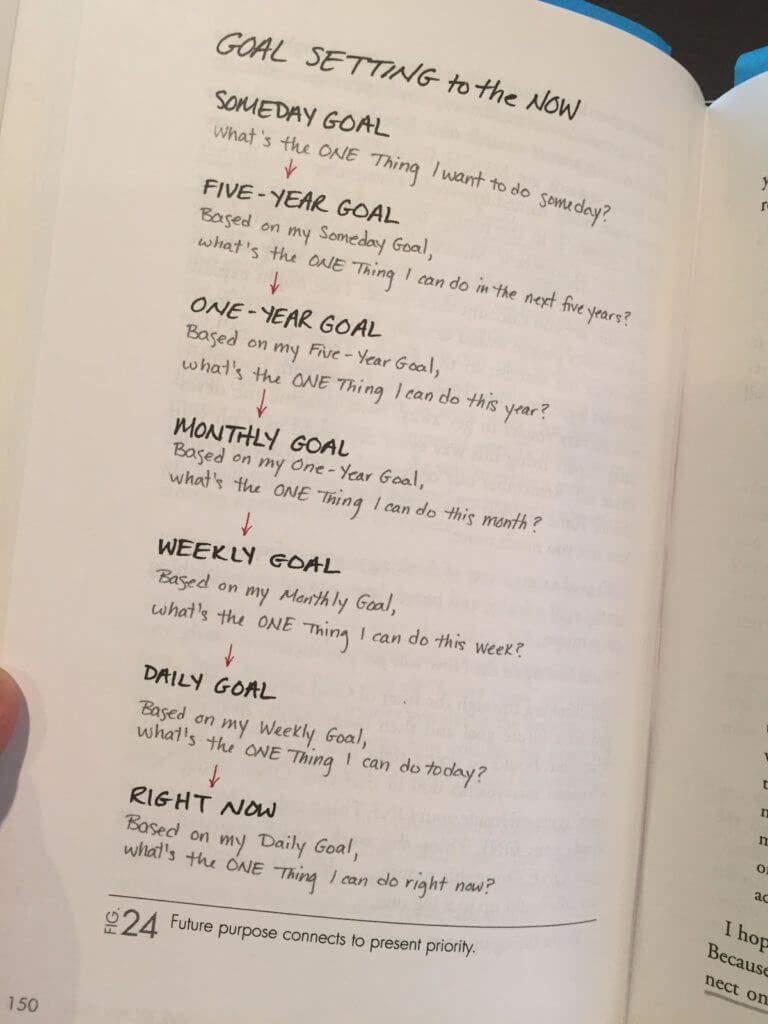
In this exercise, you’re working backwards from the big goal, creating smaller time-based goals along the way by keeping in mind a single action that you can take to meet that goal. By far, this simple exercise has had the most dramatic effect on my productivity, and I highly recommend that you think this through with the goals you have in mind not just for 2016, but beyond.
#2: Create Goal Supporting Habits
Last year, when I tackled writing Will It Fly? (which comes out in less than a month!), it was a huge struggle for me at first because I tried to write in any gap I could find in my schedule during the day. I thought I was hustling and doing the right thing because every extra piece of time I had I would sit down in front of my computer to write.
Well, I didn’t have much to show for it.
It wasn’t until I made writing routine and habitual, at the same time every single day, that the words started to flow out of me and into this book.
Habits are extremely important because when you get in habit-mode, you’re not even consciously making decisions to do things anymore, you just do them. Habits, of course, can work against you too, but when you decide to build habits that support you and your goals, you’re setting yourself up for major success.
Creating (or removing) habits is a huge topic, of course, one that may lend itself to a few podcast episodes in the near future, however if there’s one resource I can give you to help you establish these goal-supporting habits, it’s James Clear from JamesClear.com. Check him out—he never disappoints. He has what I consider to be the best content online related to habit forming.
I also interviewed Tony Stubblebine, co-founder of Lift.do (now Coach.me), in Session #80 of the SPI Podcast where we talk about forming habits and reaching goals.
In addition to business-related habits, I have many personal habits I plan to incorporate into my life here in 2016, primarily related to meditation and gratitude.
What’s one new habit that you could incorporate in your life that would support you and your goals this year?
#3: Find People to Hold You Accountable
Accountability is the top strategy that I’ve used throughout the years to help me stay on track and knock out my goals.
Accountability comes in many forms, but primarily I’ve benefited from connecting with others who I share my goals with, who know what I’m looking to achieve, and why. These people check in with me along the way, and will be there to help guide me back on track if I ever get off of it.
Sometimes, all you need is one other person to help you and it can make all the difference in the world. It’s like that gym partner who keeps you motivated on those days you just don’t want to get out of bed. You don’t want to let them down, but you also want to show up and motivate them too.
The people that have helped me the most are those in my mastermind groups, and I also have more casual and less frequent skype calls with others I’m close with, too. Whenever I’m down or just not feeling the energy, these people always lift my spirits up and get me back to where I need to be.
Find and define one person who will become your accountability partner this year for each of the major goals that you have. Set regular check-ins with each other during the year, and knowing there’s someone on the other end following along will be huge in motivating you to keep going, because when the “honeymoon period” ends after January is over, it becomes a real struggle.
To Recap, Here’s What You Need to Do if You Haven’t Already:
- Take your big goals for the year and chop ‘em up into bite-sized chunks. Then, focus on that first one thing.
- Decide on incorporating a habit into your life that is going to help you support your goals.
- Find at least one accountability partner who is going to help you follow through. Set regular dates to meet and check in with each other.
Boom! Now you’ve got some weaponry to help you smash your goals for the year. Now go forth and conquer!
If you have a moment, share one goal you’re looking to achieve this year with the rest of the community in the comment section below!
The post How to Make Sure You Follow Through on Your Goals: 2016 Edition appeared first on Smart Passive Income.
]]>Some of my all-time favorite web applications, all in one place. These web apps make my life as an online business owner so much easier. I hope they help you too!
The post 21 Web Applications I Use and Can’t Live Without appeared first on Smart Passive Income.
]]>A lot of people ask me what web applications I use, so I decided to write a post and share some of my favorites with you today!
Below you'll find a list of web applications I love, what I use them for, and some quick tips for some of them too.
Web Analytics and Optimization
CrazyEgg

CrazyEgg is an extremely useful visual web analytics tool co-founded by Neil Patel. It takes the guesswork out of trying to figure out whether or not certain elements of your website are being used. How? It shows you visually with various types of overlay maps, so that you can see exactly what's being looked at and clicked on when people visit your site.
Most recently, I've been using it to make purposeful tweaks and adjustments to the recent redesign of The Smart Passive Income Blog. I have the tool set to record data from all types of pages on my blog—from the homepage to top income producing pages (like the resource page), and even random blog posts so I can see what people are actually clicking on.

Clicky
[Full Disclosure: As an affiliate, I receive compensation if you purchase through this link.] Clicky is a web analytics tool similar to Google Analytics, but it's a lot better in my opinion, which is why I use it every day. There are a number of reasons I like it better:
- It can show me, in a glance, traffic data for multiple websites at the same time on the dashboard. This is extremely helpful for someone like me who runs online businesses.
- It's less intimidating, cleaner, and a lot more user friendly.
- I love how I can easily see, in real-time, how many people are on my website, and even pinpoint specific users and see every action they've taken on the site—from what page they entered on, to what they've clicked on, and where they've exited.
- It's easier to setup goals and campaigns in Clicky vs. Google Analytics, in my opinion.
- It's far easier to compare what happened today on your sites vs. what happened yesterday, or seven days before, or any other day.
Plus, you get support over at Clicky. It's hard to get support from Google for Google Analytics. [Full Disclosure: As an affiliate, I receive compensation if you purchase through this link.]
GTmetrix
GTmetrix is a sweet (and free) tool that you can use to check the speed and performance of your website. Just insert your URL and boom—you'll get a quick analysis and report of how long it took to load, along with a grade and what parts of your site are slowing you down.

Hand that report over to an optimization expert (or take care of some of those things on your own), and you'll have a faster loading page that will help the user experience on your website, and also help you rank higher in the search engines too, because page time affects search engine rankings!
Once you enter your URL, give it fifteen seconds to analyze it before your report shows up.
Writing

ByWord
For the longest time, I used the WordPress editor to create pages and publish posts on my blogs. Now, I realize how much better life is when I use a tool that was specifically built for writing.
There are several tools out there to help you write, but ByWord, by far, is my favorite. It's basically a “distraction-free” writing tool that clears everything out of the screen except for the cursor. It keeps my mind in focus while writing.
Plus, it's super clean and has a nice feel to it.
You can show or hide a faint word count at the bottom of the screen, and it also auto-saves on the Cloud for you, which is nice—especially if you work from multiple devices, including your iPhone—although I found the iPhone version of ByWord to be a little buggy.
ByWord ($11.99) is for Mac users only, but there are PC equivalent software solutions, such as OmmWriter.

Unroll.me
You're going to thank me for this one. Unroll.me is a web app that connects to your email account. Then it goes through all of your archives and finds any subscriptions that you have, and gives you the option to either unsubscribe from them or roll them into one single email you receive daily.
This might not sound like much, but when I connected my primary personal email account, the tool registered that I was subscribed to over 115 email lists! Quickly, I was able to unsubscribe from about 90 percent of them, and keep the rest in one daily email that sums them all up if any of those subscription emails come my way.
A genius tool, and it seriously helps with the email load. Oh, and it's free!
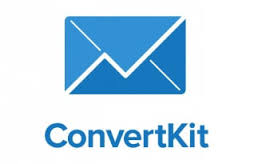
ConvertKit
If you've been following along with me on the Smart Passive Income journey, you know that I've tried a bunch of different email list management and email marketing platforms. InfusionSoft. AWeber. None of them hold a candle to ConvertKit, my favorite tool for email list management. [Full Disclosure: I am a compensated advisor for ConvertKit and earn a commission if you purchase through these links.]
ConvertKit makes managing your email list easy. Their platform is super user friendly, powerful, and the support team over there is just the best. Try ConvertKit today.
G-Lock Apps
If you're looking to improve the performance of your emails, G-Lock Apps is a good place to start. What they'll do is run tests on your emails to make sure your email marketing campaigns are in tip-top shape. When you send your emails, G-Lock will show you in real-time where the email ends up—inbox, spam, or updates.
Spam score testing, delivery duration tracking, Gmail tab tracking. They do it all. It's also pretty reasonable at $39/month, or you can just buy a few credits to test out a few emails.
Podcasting

Auphonic
Auphonic is a tool that I was recently introduced to. I'm now starting to use it for almost every podcast episode—specifically the ones that include interviews. The tool works like another tool I recommended in my podcasting tutorial called Levelator, where you process a sound file and it spits out another that has perfect sound levels. So, if you recorded an interview and the person you interviewed sounds a lot softer or louder than you, this tool would fix that and optimize the volume and levels all the way through your show.
Auphonic takes it up another level because:
- It's web based.
- You can add metadata to your files right from the upload screen, including pre-rolls and post-rolls to your show if you wish.
- You can upload an mp3 (instead of an AIFF file, which was the case with Levelator)
It's free to use for a certain amount of audio per month. Well worth it!
Social Media

Tweriod
Tweriod (Twitter + Period) is a quick and easy (and free) tool you can use to find out exactly when most of your Twitter followers are online.
This data is important because it will help you determine when the best times to tweet are. Combine this with the tool right below this one, and you've got a killer combo.
It takes just a second—so you might as well try it out right now. Are you tweeting at the optimal times?

Buffer
Buffer is one of my favorite web applications ever. Not only because it's a cool tool, but because it's run by some awesome people who share the same values of transparency and honesty as I do.
Buffer allows you to schedule Tweets, Facebook status updates, LinkedIn updates, and more ahead of time. Over 3,000,000 people use Buffer, and I'm one of them because there are a lot of interesting things you can do with the application.
If you have a lot to say, and lots of cool stuff to share, you can use Buffer to schedule those posts and tweets ahead of time, so as not to annoy your followers, but also to constantly keep in contact with them and provide value over time—almost like what you can do with an email auto-responder.
Before I move on, I just wanted to mention: automation is great, but do realize that in order to lead a successful social media campaign, you do still have to be somewhat present and have real interactions with your audience.
Organization and Productivity
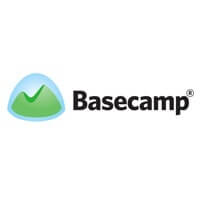
Basecamp
There are a lot of web-based project management type tools out there, and they can all organize your projects and help get the job done. I've tried Trello and Asana for months at a time, but I've always landed back to my favorite of them all—Basecamp.
This is personal preference, so I'd recommend just trying out various pieces of software until you land on one you really like, but I love the interface of Basecamp and how easy it is to manage multiple projects (because you all know how many projects I have going on at the same time) and Basecamp does help organize all of that stuff and keep me sane.
I do still have physical folders for all of my projects, but primarily for milestone and goal tracking purposes, not so much the record keeping and communication between team members. Basecamp is excellent for this.
There is a free trial period for Basecamp, but after the trial is over there is no free continuation plan. I remember running with the trial a couple of years ago, and after the first few days, I was convinced and happy to pay the monthly fee to use the software.
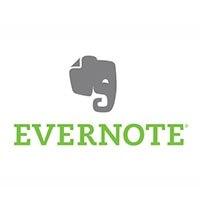
Evernote
If I were going to be stranded on a desert island (where they had Internet access of course!) and I could only bring one app with me, it would be Evernote.
I use Evernote more than any other web app out there, primarily because I treat it like my second brain. It's where I store everything I want to learn later (just not right now), and it's where I organize all of my notes for everything—from public speaking presentations, to books that I plan to publish, to courses, contact information, everything.
Whenever I get a new idea for a project I have, no matter where I'm at, I can pull out my Evernote iPhone app and add a little note to a project folder, and then I have it there when I go home and work on my desktop.
I love Evernote because it neatly organizes my everything, and everything is easily searchable too. You can sign up for a free account, but there are also Plus and Premium account for $34.99 and $69.99 per month, respectively. Those plans will give more storage and access to a bunch more features.

Evernote Web Clipper
Evernote Web Clipper is a free browser extension (Chrome, Safari, Firefox, Opera, and Internet Explorer) that makes it incredibly easy to take any piece of content on the web—maybe an article you're reading, a picture you see, or a blog post or video you came across—and save it into a specific folder within your Evernote account.
This is what I primarily use for just in time learning, which means when I come across something cool that I know is useful—it's just not going to help me right now with what I need to focus on—I can clip it into a specific folder so I can easily come back to it later. It's not like a bookmark either. It takes that content and puts it into the Evernote folder you specific, so it's right there for you later, even if you were offline (if you gave it a chance to sync first).
So cool.
1Password
1Password is another application that I use every single day.
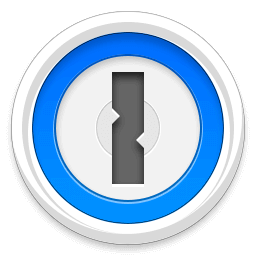
It generates and stores passwords for various things you sign up for online so that you only have to remember one master password.
It comes with a small fee, but it's totally worth not having to write your passwords down onto paper or just forget your passwords all of the time. It's incredibly secure too, which is great peace of mind.
DropBox
Oh Dropbox . . . how can I live without you? [Full Disclosure: As an affiliate, I receive compensation if you purchase through this link.]

Dropbox is top notch, affordable cloud storage—primarily because it's easy to use and incredibly affordable. You get 2GB of storage for free, although personally I pay $9.99 per month for a Pro account to handle more storage, since I do a lot of large file swapping between myself and my team.
I primarily use it off the web actually, meaning I don't even sign into Dropbox.com when I'm using it. When you download the application to your computer, your computer is essentially Dropbox enabled, so I'm often dragging and dropping and copying files into a Dropbox folder that's created in my explorer or file manager, which syncs to the cloud storage. From there, I can simply right click on anything and get the share link that I can paste into emails or chat messages.

Jing: If you have VAs, Jing is a must. When you install Jing onto your computer, you can take screenshots of whatever you see on your screen (and add graphics like arrows and things like that to them) and you'll immediately get a link you can use to share that image. Beyond that, and the feature I use the most, is you can screen record using the software too. So, instead of taking a single-framed screenshot and sharing that, I can record an entire video up to five minutes in length, and after recording it'll give me a link to share.
So instead of writing out a detailed email about how to do this thing or that, I can simply record myself doing it along with my voice instructions, and boom—it's right there in video form with a link to share with my VA. It's the best way to teach someone how to do something fast, especially with the convenience of the link without having to then upload that video somewhere and then get the link.
Jing was created by the same company that created Camtasia Studios and Camtasia for Mac.
Oh, and the best part—it's free!
Graphic Design

PicResize
It's important to keep the file size of the images on your site to a minimum. I use PhotoShop to do this sometimes, but sometimes I don't have access to PhotoShop and instead I'll use PicResize to quickly take an image of any size, and cut the file size down to a fraction while maintaining the quality of the picture.
You can upload an image from your own computer, or even use a URL for an image on the web. After you specificy the size you want and press a button, you can download a new image that's going to help you achieve faster load times and a better user experience on your site.
Tip: You can even batch process multiple images at the same time.
Window Resizer
Window Resizer is a browser extension (Chrome) that may be the most underrated tool ever. It's so handy that every time I use it, I swear I smile a little.
What it does is it gives you quick options for resizing your browser window. This becomes extremely useful when I'm recording screencasts and I want my browser size to match the size of the video exactly. Typically, I do it at 1280×720 (which is the YouTube HD size), but it could be for whatever.
I've preset the most popular sizes so that I just have to click the extension button in my browser, choose the right size and boom—all good to go.
Tip: If you're doing screencasts and you want to record your browser, but also hide your toolbar and any other tabs you may have open in that window, create a specific size in Window Resizer that's the same as the size of the video you want to export, but make sure that size is the size of the viewport (which there's an option for in this tool), not the window. The viewport is everything below the toolbar and tabbed area, so you'll be able to fit more of a webpage on the screen.
Window Resizer is 100 percent free to use. I looked for a Safari version and saw a couple that were similar, but not of the same brand behind this one, so I can't say if those are legitimate.
Video

Wistia
I recently discovered Wistia from a recommendation from Caleb when I was asking around for where I might be able to host videos for my course, * Breakthrough Blogging. After using it for about six months now, I'm really loving it. It's great for organizing videos that you want presented in a high-quality manner, and what's most impressive are the analytics that come with the videos that you upload. I can see, for example, in each of the videos I have in my course, what parts people are paying the most attention to, and where people are losing interest. As an owner of a course and someone dedicating to producing the best, most helpful content I can, this information is extremely valuable.
[Editor's Note: Breakthrough Blogging is now closed and will not be reopened. It was a good experiment and a great experience for our community.]
I'm still discovering new features and things about Wistia every time I sign in that make me love it even more, so if you're going to be creating a membership site and will be including videos in it, I highly recommend Wistia for your media storage solution.
There is a free two-week trial, and then monthly fees depending on how many videos you want to upload and how much bandwidth you're going to use.

Camtasia and Screenflow
I love screencasts. I love to record what's on my screen so I can share that information and teach on channels like YouTube and other platforms. They've been the backbone behind the success of my YouTube Channel and many of the high-quality, viral tutorials on SPI, such as my podcasting tutorial. For Mac users, there are two applications that are at the top of everyone's list when it comes to screen recording software: Camtasia and Screenflow.
For PC users, most people use Camtasia Studio—so there's really no debate there.
Right now, I'm sort of in favor of Camtasia, simply because since Mavericks for iOS came out, Camtasia was the first to be compatible and I had some issues with Screenflow—but they soon followed up with a patch and all was good again.
So, I'm not going to say use one over the other—just, these are your options, they are both fantastic and just pick one, go with it and make those videos!
To save even more time (on both Camtasia and Screenflow) I upload my finished videos directly from the application onto my YouTube account.
What About You? What Web Apps Do You Use?
Do you use any of the ones I listed above? Which ones are your favorites?
Did I miss any that you think are essential that you'd like to share with the community? Feel free to share in the comment section below!
Thanks so much!
The post 21 Web Applications I Use and Can’t Live Without appeared first on Smart Passive Income.
]]>What do you have to offer that none of your competitors can? Different than a U.S.P., I explore types of unfair advantages you must use.
The post Are You Taking Advantage of Your Unfair Advantage? (7 Examples) appeared first on Smart Passive Income.
]]>I recently started to collect voicemail messages from my audience so that I could share their questions (and my answers) right in the middle of a podcast session. The voicemail transcribed below from SPI Fan Tony P., however, is one that deserves its own blog post:
“Hey Pat, thanks in advance if you can help me out. I'm feeling pretty bummed right now. Six months ago I had a great idea for an online business and I was really amped about it. I got the “entrepreneurial bug,” as you say a lot during your show. I was so excited until I did some more research and saw that there were already 4 or 5 other businesses doing exactly what I wanted to do, so I tried to think of something else instead. I haven't thought of anything good yet, but that's not why I'm bummed. I'm bummed because I opened my email today and saw a Google Alert with a link to a brand new company that recently launched that is doing exactly what I wanted to do 6 months ago! They seem to already have a number of users and are positioned to do really well.
I don't even know why I'm calling you. I think I just needed to tell someone who could understand. I'm sorry for the rant. I just feel like if I acted 6 months ago I could have something up and running already, but then again there were already businesses in the space that I wanted to get into…but these guys did it. I'm guessing they had a lot of money to begin with, which I don't have. How can I compete with other businesses when I'm bootstrapping from the start? Should I just find a niche or business that doesn't have any competition instead? Thanks again for hearing me out Pat. I love the show.”
Thanks for the voicemail Tony! Now, let's dive right in.
An Idea Stopper
I've spoken to a lot of people who are interested in starting an online business, and almost everyone goes through the same two-step cycle:
- An idea, followed by feelings of incredible excitement, hope, planning, mindmaps, wireframes and “what if this works!”; then…
- An external element comes into play, before the business is even started, followed by feelings of incredible doubt, apprehension, fear and “what if this doesn't work!”
At this point, some people persevere, while others move on to something else.
That “external element,” also known as an “idea stopper” can come in many forms:
- The realization that the project is going to take a lot more work than expected.
- Not knowing exactly where to start.
- Skepticism by friends and family.
- A “change in weather.”
- Competition.
I put “a change in weather” in there, not because the weather actually has an affect on how we follow through, but because a lot of times it just seems like people are looking for any ol' excuse not to move forward and succeed. In Why Some Entrepreneurs Undermine Their Own Success, the writer points out that many entrepreneurs, consciously or subconsciously, feel that success will lead to loneliness or envy, or that it'll change their lifestyle or be too expensive—or that they just straight up don't feel like they deserve it.
Competition, on the other hand, can be seen. A quick search in Google and you're likely to find other businesses who are already in the same space that you'd like to get into.
Competition is a good thing—you've heard me say this before. Coming in later in the game is an advantage because you can see what existing businesses are doing right and what they're doing wrong. You can be a consumer before you become a company, and can better understand the experience that customers currently have, and what options are available to them in today's market. You have the ability to come in and reshape that customer experience in whatever way you'd like.
When SmartPassiveIncome.com was born, I came into it knowing that the make money online niche was extremely competitive, and there were definitely more than 4 or 5 existing websites out there talking about a similar topic—there were thousands. Probably tens of thousands.
What helped SPI was a number of different strategies, but it really comes down to two things:
- Seeing what everyone else is doing and purposely doing something different. This is where generating my income reports, expanding into a Podcast, and just being completely honest and transparent comes into play, among other things like not selling directly to my email list. These were conscious decisions that I made because of what everyone else in this space was doing.
- Taking advantage of my unfair advantages.
Types of Unfair Advantages
I was first introduced to the term unfair advantage, in the context of online business and blogging, by Lain Ehmann who was the featured guest on SPI Podcast Session #37: How to Monetize a Hobby Niche. To date, her episode is one of the most popular success stories on the podcast because Lain shares exactly how she's now earning 6-figures a year in the scrapbooking niche.
She described an unfair advantage as a skill or asset that you have that no one else has, or very few others might have in a specific niche. It's your competitive edge, and whatever that edge may be, it's your job to use it to your advantage as much as possible as you shape and create your business.
This is different from a Unique Selling Proposition, or USP.
As Corbett Barr from CorbettBarr.com says:
I like to think of your overall USP as your reason for being. Think about it from your customer’s point of view. With tens or hundreds of potential options out there, you have to answer the question, “why should I buy from you?” Or, “why should I read your blog, when there are millions of other blogs I could be reading?”
Corbett Barr
You definitely need a USP, but a USP is not your unfair advantage. It's how your business will stand out of the crowd, but a USP is not the skills or assets that can help you get there.
You can't sell your skills, but you can and should absolutely use them to build and shape your business or blog.
To understand more about unfair advantages, I've listed 7 different types below, some of which you may already have within the market you're in or looking to get into. If you find one or more that matches you, use it to your advantage.
Let's start with the one Lain shared about how she got started…
1. Your Rolodex—The People You Know
You know and have access to the right people in your industry, people who others do not have access to. You're a connector, and you can provide value to a specific audience by using the connections you've made over time.
Lain's experience freelance writing for scrapbooking magazines put her in contact with some of the top people in the industry. She later started an online event called True Scrap that brings all of these people together to teach live classes, and thousands of people have attended and benefited from her ability to connect with the right people.
Who do you know that others in your industry might not?
2. Your Experience—What You've Been Through
Last year, I watched an episode of Shark Tank where I was introduced to Major Robert Dyer. Major Dyer was pitching a new energy drink called The Ruck Pack Energy Drink. It's not like the world needs another energy drink, but he was able to convince both Kevin O'Leary and Robert Herjevic, two of the investors on the show, to give him $150k in exchange for 20% of the company.
Major Dyer used his experience in the Army to create an energy drink that was perfect for a combating soldier. He was actually in Afghanistan when he came up with the concoction.
His experience became his advantage because he was in extreme conditions that allowed him to create and test a drink of this kind of caliber, one that provided this kind of energy and focus that a combating soldier needed. I doubt the guys at Red Bull or Monster put themselves in the line of fire when testing the capability of their drinks.
When I started SmartPassiveIncome.com, I already had experience with a successful, automated online business at Green Exam Academy. A lot of people were providing online business advice at the time, but most were using other people's businesses as examples, or just spoke theory with no real case studies to back it up. Here, I was able to use my own experience as evidence, and it helped me become more credible right from the start.
What experiences in your life have given you the ability to prove yourself or your business more than others?
3. Your Story—And How You Tell it
Stories are incredible marketing tools. They stick. People who listen to or read stories transport themselves into the situations that are described and the storyteller is better able to make a deeper connection with his or her audience.
We all have a story to tell. If you have a good one, tell it and use it to your advantage.
I know I have a great story. I've shared it here on the blog and I even went deeper into the story for my first book, Let Go. [Click to buy on Amazon. Full disclosure: I receive affiliate revenue if you purchase through this link.]
It's funny because when I'm interviewed for podcasts and radio shows, many times the interviewer will apologize and say, “I'm sorry…I know you've probably told your story hundreds of times before, but I'd like you to tell it again if you don't mind.”
I always respond with “Of course!”
I love telling my story, not just because it reminds me of where I came from which always gives me a motivational boost, but because I know it's a great way to connect with an audience. To have the opportunity to share it right from the start is awesome.
Of course, your stories should always be true, but if you have a good one make sure there's a way for people to hear it.
What's your story and how can it help your business?
4. Your Hustle—How Much You Put In and Where
Gary Vaynerchuk, author of one of my favorite books, Crush It, would probably agree with me when I say that sometimes all you need to do is hustle. I mean like, truly hustle. The all-out just insane amounts of work kind of hustle. [Click to buy on Amazon. Full Disclosure: As an affiliate, I receive compensation if you purchase through this link.]
Not everyone has the time or ability to hustle, and of course the work that's done has to be the right kind of work – the right kind of hustle.
John Lee Dumas, host of a ‘new' podcast called Entrepreneur On Fire, is a perfect example of someone who is using his ability to hustle to his advantage.
John has a daily (yes, daily) podcast where he features an interview with a successful entrepreneur. He just started his show this past October, and he's already up to episode 177. That's nearly 3 times as many shows that I have!
Now, John enjoys over 200,000 downloads per month, he's written a book, has products and has opened up a ton of opportunities for sponsorships and partnerships that wouldn't have come otherwise. He's not the first person to have a show dedicated to interviewing rock star entrepreneurs—not even close—but he's definitely the fastest to see these kinds of results.
He's not just working hard either, he's working smart. Hustle doesn't mean just pure physical and mental work, it can mean spending the time to put the right systems into place to generate more output.
What's something successful that other businesses are doing that could use your hustle to stand out?
5. Your Personality & Your Ability to Connect to Others
Out of the 7 billion people in this world, you are uniquely you. Within specific markets and niches, you are definitely uniquely you. If you have a personality that people can easily connect with you shouldn't be afraid to share it.
In 2009 when struggling to get traffic to this blog, I had a chat with Jeremy Frandsen from Internet Business Mastery. He told me I had a magnetic personality and I should find other ways to share it. That's when I started my YouTube Channel, and then later, my podcast, which just passed 2,000,000 views and 3,000,000 downloads, respectively.
Similarly, in some niches, injecting any kind of personality into your business is an advantage. This is especially true when it takes more than 7 seconds to find a person's name on your competitors' websites.
For example, when I started GreenExamAcademy.com to teach people how to pass the LEED Exam (a specialized exam in the architecture industry), I was the only person in the industry teaching about this exam that people could call by name. Every comment and email would start with: “Hey Pat…”
Right on the front page (even today) you can see my picture along with my name and a little description of who I am.
When the United States Green Building Council (USGBC), the organization that actually administers the LEED Exam eventually came out with their own sets of study material, I thought my business was doomed. How could I compete with the actual organization that writes the test questions and grades the exams?
Well, to my surprise, when the USGBC launched their study material, my sales went up—significantly.
Why?
Since they had a lot of overhead and several people to pay, the price of their material was pretty steep. When people wanted to see what else was available and compare prices, after searching in Google or asking around, my name always came up. In the end, people were more comfortable purchasing from me because they knew exactly who they were purchasing from, and they were happy to receive advice from Pat, a real person who took the same exam these people were studying for, as opposed to a larger, faceless and less personal organization. No offense to the USGBC, of course. They are an amazing organization, but that's exactly what they are, an organization. Even though I had a business too, people were happy to deal with Pat.
6. Your Ability to Listen, Build, Measure and Learn
All companies build something, but not all of them measure, learn and then adapt or shift.
I've recently been listening to The Lean Startup by Eric Reis, which is a fantastic book about how today's entrepreneurs and startup companies are approaching the way they create and innovate. In it, the author talks about how vital it is to use validated learning and scientific experimentation to be able to steer a company in the right direction. In other words, to use customer feedback and quantified data analysis (of real, non-vanity metrics) from a minimum viable product to make decisions and pivot a business one way or another. [Click to buy on Amazon. Full Disclosure: As an affiliate, I receive compensation if you purchase through this link.]
If you have the ability to see what holes lie in existing markets before you enter it, the ability to listen to a target market (or become a customer yourself who is extremely conscious of the overall customer experience), and learn from the wins and failures of the companies that already exist, you will have an edge over your competition.
Like I mentioned earlier, coming in late in the game can be an advantage if you listen, learn and provide solutions for what seems to be missing. Even coming into a market with minimum viable product, you'll have the advantage of being able to get deep into the customer experience to shape your product or service to what it should be, again, all based on what you're able to measure and learn.
There is a lot more to be said about lean startup methods and the build-measure-learn feedback loop. Would love to get Eric Reis on the podcast if possible. 
7. Your Specialization—Who You Serve and Your Ability to Do So
It's not just the skills and experiences that you have to offer that can give you a competitive edge, it can also be that fact that you want to serve a more specialized segment of a market.
Generally, the more specialized you get, the less competition you have to deal with. In addition to that, the more specialized you get, the better you can hone in your skills for a particular group of people. Your advantage is your knowledge of and ability to serve that particular segment of the larger market.
Take for example, shoes.
Everyone (well, almost everyone) buys shoes. If you wanted to enter the shoe market, you might think your competitors are retailers like Zappos, EastBay, Sketchers and other large online retailers. Then there's Nike, Reebok too. It's virtually impossible to compete with them, especially when you're bootstrapped. So what can we do?
Specialize.
Instead of getting into the market to sell all types of shoes, how about serving a part of the market that's looking for a specific type of shoe: running shoes, walking shoes, children's shoes, etc.
Even at this level of specialization, however, it's not quite an advantage yet because companies already specialize in these types of shoes: Foot Locker, The Walking Company, and Stride Rite, respectively. Now what?
Specialize again.
Within running shoes, how about soccer cleats? Within soccer cleats, how about women's soccer cleats?
When your target market is women who are looking for soccer cleats, it's much easier to do market research and enter the build-measure-learn feedback loop. You have an advantage over others who are targeting a larger segment of the market.
Trunk Club, is a great example of this kind of specialization at work.
Like lots of other businesses, they sell clothes. That in itself is not very special.
But, their target market and who they serve is special, and it's not everyone. Their target market is specifically men who want to dress well who either don't like to go shopping, or don't have the time to do so.
It works like this:
You speak to a personal stylist over the phone, they ask you a number of questions to get to know you a little better and figure out your style, and then they send you a Trunk with a number of pieces of clothing in it based on your conversation.
You try stuff on, keep what you like, and ship back what you don't like in the same trunk. Shipping is already paid for.
Boom. New clothes and I didn't even have to leave my house. No membership fees, you just get a trunk whenever you want, and they charge you for pieces that don't return.
I've received two trunks so far and another is on the way. I've kept roughly 35-40% of what was shipped to me .
I heard about this service from a friend, and I've definitely passed this service onto others. Not everyone, but other men around the same age who are in situations where they might need to dress up and they might be too busy to go shopping on their own.
You see, when you specialize and can provide value to a specific segment of a market, those people within that market tend to talk to each other about you.
How can you specialize and become the topic of conversation when those people get together?
What About Content?
Remember that skills like writing, video production, speaking, creating products—stuff you create that your audience consumes directly—these can all be unfair advantages too. If you write better, create better videos or have better podcasts and products than your competitors, then of course, those are definitely skills you should be taking advantage of—but that's almost a given.
The reason I bring this up is because when you're first starting out, it can be deflating to write because your writing isn't the best. It's deflating to create videos that don't look as good and it's deflating to take forever to record your first podcast session or struggle with your first product. That was me. When I first started, I always felt deflating and what I was producing wasn't where I wanted it to be. Everyone else was already a step ahead.
Over time, these skills started to improve and what was once a burden became my advantage. This is why I'm big on using multimedia in your brand and Being Everywhere, because not everyone is doing it.
So, to Tony who left that original message at the top of this post, my summarized answer to you would be this:
Just because there are competitors doesn't mean you should try to find something else. Not yet. Even now, it's not necessarily too late. Existing competitors tell you that there's a market for your idea already and you can investigate to see how consumers react to what is already being offered, both positively and negatively, to shape and inspire your own approach. How can you compete? Money isn't the answer. Although it can help, having loads of it isn't necessary. The real answer to being able to compete is to showcase and utilize whatever you have to offer that none of the other businesses can. In other words, your unfair advantage. What is it? Figure it out, milk it, and then make something happen.
If you enjoyed this post, please help me out by sharing it using one of the share buttons adjacent to this post!
Cheers, and my prayers to everyone around the Boston area and everyone affected by the recent tragic events that happened. Be safe.
The post Are You Taking Advantage of Your Unfair Advantage? (7 Examples) appeared first on Smart Passive Income.
]]>If you want to succeed, you NEED to find a mastermind group and/or a mentor to help guide you along the way. Don't ask me, ask these millionaires.
The post Mastermind Groups and Mentors: Why You Need Them and How to Find Them appeared first on Smart Passive Income.
]]>With Thanksgiving just a couple of days away here in the U.S., I wanted to talk about something I'm extremely thankful for—being in a mastermind group.
A mastermind group is a small group of people who regularly meet, online or offline, to talk about goals, growth and success and provide support for each other. I've talked about mastermind groups here on the blog before and just how vital being in one has been for my businesses. I absolutely know that I would not be where I'm at today if it weren't for my participation in a mastermind group. In fact, it was a member of one of my first mastermind groups (I'm actually in 3 different ones now—all online) that suggested that I publish an ebook for my first online business at GreenExamAcademy.com, which ended up changing the course of my entire life.
Today, I'm happy to share a guest post by my dear friend Jaime Masters from Eventual Millionaire. Jaime is a business coach who is also a member of one of the mastermind groups that I'm in! She has interviewed over 70 millionaires and dissects why successful people are successful. One common theme throughout most of her interviews is the use of a mastermind group or a mentor.
Jaime fills in all the gaps that were missing in my previous posts about mastermind groups and mentorship, including downloadables for the structure of a meeting and a worksheet to help you find group members. Enjoy!
The only reason why Pat and I are good friends is because of a mastermind group. Over two years ago, I knew nothing about blogging but asked the amazing Pat Flynn to be a part of my mastermind group.
He said yes. 
I always knew mastermind groups and mentors were an important part in becoming successful no mater what industry you were in. It became truly apparent when I started to interview millionaires. I've interviewed over 70 millionaires and over and over it came up again that a key mentor or a mastermind group helped their success exponentially.
Todd Tresidder a millionaire of FinancialMentor.com (who is in our mastermind group too!) said this about mastermind groups:
“A mastermind is an example of going pro where what you do is you build a structure that literally pulls your business forward. It keeps you from getting sidelined. It keeps you from getting distracted, because you’re building a support system. You have a comfort zone of success that you’re accustomed to and as you break through those thresholds, you need mechanisms to pull you through it. So that’s the help of a mastermind group.”
Todd Tresidder, FinancialMentor.com
Ryan Blair the cofounder of ViSalus (who is worth $1,000 a MINUTE) said this about mentors:
“I’m looking for mentors every day. People think there is your one mentor that helps you. I have many. I sought mentorship from everyone—from all time winning coaches to businessmen to spiritual mentors.
Ryan Blair
I have many mentors (one of the millionaires I interviewed became a mentor!) and a mastermind group. They are critically important in reducing your learning curve and getting you on the right track.
So today, I want to break down the process. I want you to read this whole article and then go get your own mentor or mastermind group (or both!). If you don't plan on doing that, then don't waste your time reading this article.
So are you committed to taking action?
Good, let's continue.
Now, there is a pretty big difference between a mastermind group and a mentor:
A mastermind group is about four to seven people of your peers, people in the trenches just like you working on their business, learning and growing. They’re giving current resources, tactics and things that work for them plus they give you support. Usually you meet on a schedule, either weekly or biweekly.
A mentor is a trusted adviser or guide. You don't necessarily need to speak with them every week. A business mentor may help with strategy in business, raising your level of confidence, pushing you out of your comfort zone and more.
Mastermind Group
Here is one example of how a mastermind group helped millionaire Tim Hamilton, owner of Astonished Designs. He was very open in his interview and explained the huge amount of fear he experienced as a business owner. One of the catalysts that help him get past his fear was his mastermind group.
He said:
“My mastermind group was me and three other people that all wanted to grow. We all experienced some level of pain but we were separated by these forces in society that give us the information that we all have to appear totally competent, totally on top of things, totally together as if fear doesn’t factor into our lives.
There was one meeting when the four of us, in that room, decided to show each other that we were all vulnerable, struggling and scared.
That was what made all the difference in the world. We realized that if any one of us ever realized our greatest fear (which is essentially to lose everything), everyone’s couch was open to everyone else who needed to sleep on it for a night.
So I knew that at the end of the day my greatest fear of going out and living, ending out on the streets and just losing everything, it just was never going to happen.
The most important part of that experience is that I realized that security actually comes from relationships.
I thought it came from a certain amount of money, a signed contract, a verbal commitment from the next huge customer, but I think the greatest source of security comes from relationships.”
Tim Hamilton
So how do you get involved in a mastermind group?
Well there are many programs that you pay for that will give you a mastermind group. Some of them will be amazing and some of them will not be the right fit.
For me personally, I like to have a big say in the formation of the group, who is in it, and when it meets. Think long term. If this group is amazing, you want to be with them for years.
You may be thinking, what if I don’t have an amazing group of successful friends to ask?
That’s okay.
When I decided to go online I didn't know a lot about blogging. I read a lot, and tried to take it all in. But I wanted to TALK to people that knew that they were doing, that could help direct me. It's hard to know what is worth it and not worth it online.
I couldn’t just pool of friends I had because most of the friends I had didn’t have online business success. If you already have successful friends in business, think about creating a mastermind group with them.
I ended up with a stellar mastermind group of all new people by doing these things:
1. Find Your Potential Members
Invite people to the group that you think are way better than you.
There is a delicate balance in a mastermind group, but you want to get others that have what you want.
If you are thinking – If they are already awesome, why would they want to be in my mastermind group? There are a few reasons: You can connect them with other amazing people, so if you get one awesome person to say yes, it's easier to get others to join.
Also, you probably don't give yourself enough credit. Think of some of the amazing things you have done before, and list it to entice new people to join.
Make sure the group will be highly valuable (like 10x!) to them. They do not need to spend their time doing things that won't return the value multiplied.
List ten people in your extended network or peers that you don’t know yet, but would be great for your mastermind group. Then choose one on the list and craft a simple short email to them.
DOWNLOAD: If you want a worksheet that will help you do this and craft an email, download the Mentor and Masterminding Worksheet!
2. Create a structure and format, and get commitment.
Entrepreneurs usually need more structure. They need to know what is expected of them before they say yes.
Here you can download the exact structure and format I sent to the potential mastermind participants. It will also give you a format that works.
DOWNLOAD: Here is the exact pdf that I sent over two years ago when I started my mastermind group. Our structure is still the same today.
So if you want to have accountability, peer support, brainstorming, and meet amazing new people, a mastermind group would be perfect for you. Download the worksheets and get started.
Mentors
Finding a mentor is somewhat similar to getting a mastermind group, except that you don't need to formally ask them to be a mentor. Many times you start to build relationships with people in such a way that you could call them a mentor, but neither one of you officially asked!
Now, a mentor is someone you don’t necessarily seek to be your best friend. Mentors are someone you can ask for advice occasionally, and they will respond. You want someone that’s very high level. They’ll give you insider knowledge for strategy and planning.
Here are a few pieces of advice on finding a mentor:
Q. How Do I find a potential mentor?
A. There are so many ways to find a mentor. It could be someone you found online like millionaire Amos Winbush.
Amos Winbush owner of CyberSynchs said,
“It’s so easy these days with LinkedIn, Facebook and Twitter to reach out to people. I have one of the most great friendships with Jeffrey Hayzlett from Twitter who is Chief Marketing Officer of Kodak and that’s how we started talking. It’s through Jeff Hayzlett that my company started talking to Kodak and it was on Twitter so it’s definitely possible.”
Amos Winbush
My first mentor (A local business coach that sold a million dollar business) I found by emailing, and asking to sit down for a chat.
Another business owner became my mentor because he was one of the millionaires I interviewed. I asked him for a follow up chat, and he said yes.
Keep your eyes open for potential mentors in everything you do. It's easier than you think when you are specifically looking and asking often.
Q. Why would a mentor even want to work with me?
You may be telling yourself, I haven’t done anything yet! I’m not big. I don’t have money to pay them. It's not about what you have already done, and I believe you shouldn't have to pay your mentors.
When I asked Amy Applebaum a business coach and millionaire she said:
“It is about enrolling people in your vision. If they’re not enrolled in your vision, they will not participate. But most people love to help. There’s help right in front of us.
It can be a friend’s family member. It can be a friend of a friend. It can be someone who is a business associate. You just want to aim high. (Not aim high celebrity, like Oprah!)
You need a really successful person that’s more behind the scenes so that they have access and will give you time.”
Amy Applebaum
You must show your commitment or strength or it will never happen. That means being committed to listening to them when they do respond.
Take action on what they say. No one wants their great advice to fall on deaf ears.
Action Item: List ten people you admire that have done exactly what you want to do and might seem a little bit out of reach.
Go Take Action Now!
So if you read this far, you've already committed to yourself. This does not take a lot of time, and once you get the support you need it will save you many hours of issues!
I want you to be able to email Pat with amazing stories of how you formed a mastermind group or gained a new mentor.
For more from Jaime, please check out her blog at Eventual Millionaire and be sure to dive into her extensive collection of incredibly inspiring and useful interviews with millionaires from all different fields and industries!
The post Mastermind Groups and Mentors: Why You Need Them and How to Find Them appeared first on Smart Passive Income.
]]>